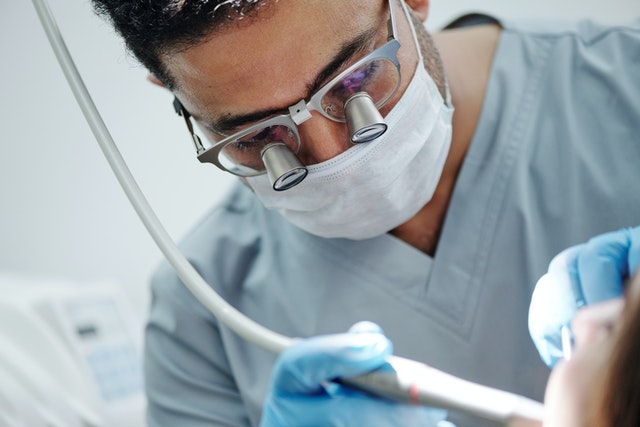Have you been experiencing pain when chewing? Are your gums bright red and swollen, or do you spit blood after brushing or flossing? These may be signs and symptoms of periodontal disease—
a dangerous gum infection that affects the soft tissue and can ruin the bone that supports your teeth if left untreated. A regular dental examination can help a dentist spot early signs of periodontal disease and keep track of and maintain your periodontal health over time. The sooner you seek dental care, the better your chances of effective treatment. In this article, we discuss the causes and symptoms of periodontal disease.
Causes of periodontal disease
Below are some risk factors for periodontal disease.
Poor dental hygiene
Poor dental hygiene is the most common cause of periodontal disease. Your mouth can have hundreds of different species of bacteria. Plaque, a sticky coating made of bacteria, is the most common cause of gum inflammation. Here’s how plaque can progress to periodontal disease if left untreated:
- Plaque builds on your teeth when starches and sugars in food mix with bacteria in your mouth. Brush teeth daily to remove plaque.
- If plaque remains on your teeth, it can solidify into tartar below the gum line. Plaque and tartar cause more harm the longer they stay on your teeth and may require professional dental cleaning to remove.
- Unremoved plaque causes gingivitis—a gum disease that causes irritation and inflammation of your gum tissue.
- Ongoing gum inflammation can lead to periodontal disease.
Obesity
Obesity may be linked to periodontitis because of increased reactive oxygen species (ROS) production. Excessive amounts of ROS and decreased antioxidant molecules in periodontal tissues can cause persistent inflammation and gum tissue damage. If you eat a low-nutrient diet, your immune system may be weakened, making it difficult to fight infection.
Smoking
Smoking interferes with the normal functioning of gum tissue cells. It also weakens the body’s natural defenses against illness (your immune system). This makes fighting a gum infection more difficult. Smoking decreases blood flow to the gums and may compromise wound healing; if you’re a smoker, you may be prone to periodontal disease.
Genetics
Your genetics may make you more susceptible to periodontal disease. If you’re genetically prone to tooth decay or gum disease, you have a higher risk of having oral health problems regardless of how well you floss and brush your teeth. For example, a mother with periodontal disease may pass an increased risk of the disease to her children.
Diabetes
Diabetes can cause changes in the blood vessels. The thickening of blood vessels can slow the flow of nutrients and waste disposal from body tissues. Your gums and bones can be weakened because of diminished blood supply, thus becoming more susceptible to infection. Diabetes can also lead to higher blood sugar levels in oral fluids. This encourages the development of bacteria that can lead to gum disease.
Hormonal changes
Women go through various hormonal fluctuations, making them more sensitive to oral health issues. Gums become more sensitive because of hormonal changes such as those that occur during pregnancy, puberty, menopause, and monthly menstruation. These hormonal changes affect the blood supply to the gum tissue and the body’s response to the toxins produced by plaque buildup. Because of these changes, women are more likely to get periodontal disease and other oral health concerns at different stages of life.
Medications that reduce saliva production
Medications can affect oral health because some reduce saliva flow. When the salivary glands fail to produce enough saliva to keep the mouth wet, food debris and germs can’t be washed from the surface of the teeth, increasing the risk of cavities and periodontal disease. Some medications, including the anticonvulsant Dilantin and anti-angina medicines Procardia and Adalat, can promote abnormal gum tissue growth.
Diseases that suppress the immune system
Cancer and AIDS are examples of diseases that limit the immune system’s response. Patients with these diseases are at higher risk of developing infections, including periodontal disease. These diseases can cause the most severe periodontitis, known as necrotizing periodontitis.
Symptoms of periodontal diseases
Here are symptoms of periodontal diseases:
- Pain when chewing
- Loose teeth
- Swollen and/or bleeding gums
- Gums that are tender or sore when touched
- Spitting blood after brushing or flossing your teeth
- Sensitive teeth
- Persistent bad breath
- Pus between your gum and teeth
- Gaps forming between your teeth
- Gums that pull away from your teeth
- Alterations in the way your teeth bite together
- Gums that are bright red, dark red, or purple
- Foul taste in your mouth
- Inflammatory responses throughout your body
Are you looking for a dentist in Klamath Falls, Oregon?
If you need treatment for periodontal disease and are looking for a dentist, contact us at Klamath Smiles.
At Klamath Smiles, we are committed to providing our patients with exceptional dental care in a comfortable atmosphere. We will always put your interests first by carefully listening to your dental concerns and giving you a choice in every step of your dental experience.
Call us at (541) 882-9039 or use our contact form to schedule an appointment.
